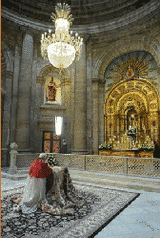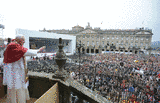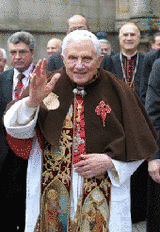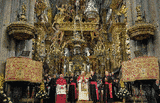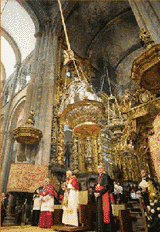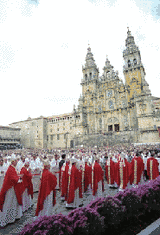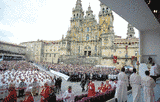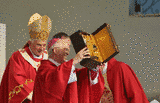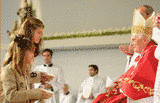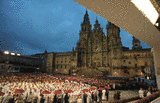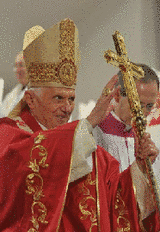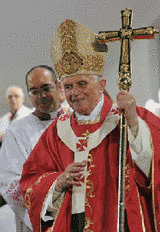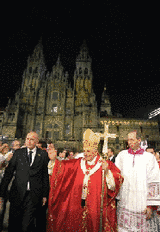Benedict XVI's 2nd Apostolic Visit to Spain
6th - 7th November 2010
Papa Benedicto XVI was a pilgrim to Spain in 2010 for the Holy Year of Compostela in Santiago and the dedication of the church of the Sagrada Familia in Barcelona. This was his 18th apostolic journey and his second pilgrimage to Spain (his first was in 2006 & his third was in 2011 for JMJ Madrid)
Discurso del Santo Padre Benedict XVI en la Ceremonia de Bienvenida
Aeropuerto de Santiago de Compostela, Sábado 6 de noviembre - in English, French, German, Italian, Portuguese & Spanish
"Altezas Reales, Distinguidas Autoridades Nacionales, Autonómicas y Locales,
Señor Arzobispo de Santiago de Compostela, Señor Cardenal Presidente de la Conferencia Episcopal Española,
Señores Cardenales y Hermanos en el Episcopado, Queridos hermanos y hermanas, Amigos todos
Gracias, Alteza, por las deferentes palabras que me habéis dirigido en nombre de todos, y que son el eco entrañable de los sentimientos de afecto hacia el Sucesor de Pedro de los hijos e hijas de estas nobles tierras.
Saludo cordialmente a quienes están aquí presentes y a todos los que se unen a nosotros a través de los medios de comunicación social, dando las gracias también a cuantos han colaborado generosamente, desde diversas instancias eclesiales y civiles, para que este breve pero intenso viaje a Santiago de Compostela y a Barcelona sea del todo fructuoso.
En lo más íntimo de su ser, el hombre está siempre en camino, está en busca de la verdad. La Iglesia participa de ese anhelo profundo del ser humano y ella misma se pone en camino, acompañando al hombre que ansía la plenitud de su propio ser. Al mismo tiempo, la Iglesia lleva a cabo su propio camino interior, aquél que la conduce a través de la fe, la esperanza y el amor, a hacerse transparencia de Cristo para el mundo. Ésta es su misión y éste es su camino: ser cada vez más, en medio de los hombres, presencia de Cristo, “a quien Dios ha hecho para nosotros sabiduría, justicia, santificación y redención” (1 Co 1,30). Por eso, también yo me he puesto en camino para confirmar en la fe a mis hermanos (cf. Lc 22, 32).
Vengo como peregrino en este Año Santo Compostelano y traigo en el corazón el mismo amor a Cristo que movía al Apóstol Pablo a emprender sus viajes, ansiando llegar también a España (cf. Rm 15,22-29). Deseo unirme así a esa larga hilera de hombres y mujeres que, a lo largo de los siglos, han llegado a Compostela desde todos los rincones de la Península y de Europa, e incluso del mundo entero, para ponerse a los pies de Santiago y dejarse transformar por el testimonio de su fe. Ellos, con la huella de sus pasos y llenos de esperanza, fueron creando una vía de cultura, de oración, de misericordia y conversión, que se ha plasmado en iglesias y hospitales, en albergues, puentes y monasterios. De esta manera, España y Europa fueron desarrollando una fisonomía espiritual marcada de modo indeleble por el Evangelio.
Precisamente como mensajero y testigo del Evangelio, iré también a Barcelona, para alentar la fe de sus gentes acogedoras y dinámicas. Una fe sembrada ya en los albores del cristianismo, y que fue germinando y creciendo al calor de innumerables ejemplos de santidad, dando origen a tantas instituciones de beneficencia, cultura y educación. Fe que inspiró al genial arquitecto Antoni Gaudí a emprender en esa ciudad, con el fervor y la colaboración de muchos, esa maravilla que es el templo de la Sagrada Familia. Tendré la dicha de dedicar ese templo, en el que se refleja toda la grandeza del espíritu humano que se abre a Dios.
Siento una profunda alegría al estar de nuevo en España, que ha dado al mundo una pléyade de grandes santos, fundadores y poetas, como Ignacio de Loyola, Teresa de Jesús, Juan de la Cruz, Francisco Javier, entre otros muchos; la que en el siglo XX ha suscitado nuevas instituciones, grupos y comunidades de vida cristiana y de acción apostólica y, en los últimos decenios, camina en concordia y unidad, en libertad y paz, mirando al futuro con esperanza y responsabilidad. Movida por su rico patrimonio de valores humanos y espirituales, busca asimismo superarse en medio de las dificultades y ofrecer su solidaridad a la comunidad internacional.
Estas aportaciones e iniciativas de vuestra dilatada historia, y también de hoy, junto al significado de estos dos lugares de vuestra hermosa geografía que visitaré en esta ocasión, me dan pie para ensanchar mi pensamiento a todos los pueblos de España y de Europa. Como el Siervo de Dios Juan Pablo II, que desde Compostela exhortó al viejo Continente a dar nueva pujanza a sus raíces cristianas, también yo quisiera invitar a España y a Europa a edificar su presente y a proyectar su futuro desde la verdad auténtica del hombre, desde la libertad que respeta esa verdad y nunca la hiere, y desde la justicia para todos, comenzando por los más pobres y desvalidos. Una España y una Europa no sólo preocupadas de las necesidades materiales de los hombres, sino también de las morales y sociales, de las espirituales y religiosas, porque todas ellas son exigencias genuinas del único hombre y sólo así se trabaja eficaz, íntegra y fecundamente por su bien.
[En gallego] Benqueridos amigos, reitérovos o meu agradecemento po la vosa amable benvida e a vosa presencia neste aeroporto. Renovo o meu agarimo e proximidade aos amadísimosfillos de Galicia, de Cataluña e dos demais pobos de España. Ao encomendar à intercesión do Apóstolo Santiago a miña esta día entre vós, prégo lle a Deus que as suas bendicións vos alcancen a todos. Moitas gracias."
Palabras del Papa Benedicto XVI en la Catedral de Santiago de Compostela
Saturday, 6 November 2010 - in English, French, German, Italian, Portuguese & Spanish
"Señores Cardenales, Queridos Hermanos en el Episcopado, Distinguidas Autoridades,
Queridos sacerdotes, seminaristas, religiosos y religiosas, Queridos hermanos y hermanas, Amigos todos
[En gallego] Agradezo a Monseñor Xulián Barrio Barrio, Arcebispo de Santiago de Compostela, as amables palabras que agora me tendirixido e ás que correspondo compracido, saudándo vos a todos vós con afecto no Señor e dándovo-las gracias po la vosa presencia neste lugar tan significativo.
Peregrinar no es simplemente visitar un lugar cualquiera para admirar sus tesoros de naturaleza, arte o historia. Peregrinar significa, más bien, salir de nosotros mismos para ir al encuentro de Dios allí donde Él se ha manifestado, allí donde la gracia divina se ha mostrado con particular esplendor y ha producido abundantes frutos de conversión y santidad entre los creyentes. Los cristianos peregrinaron, ante todo, a los lugares vinculados a la pasión, muerte y resurrección del Señor, a Tierra Santa. Luego a Roma, ciudad del martirio de Pedro y Pablo, y también a Compostela, que, unida a la memoria de Santiago, ha recibido peregrinos de todo el mundo, deseosos de fortalecer su espíritu con el testimonio de fe y amor del Apóstol.
En este Año Santo Compostelano, como Sucesor de Pedro, he querido yo también peregrinar a la Casa del Señor Santiago, que se apresta a celebrar el ochocientos aniversario de su consagración, para confirmar vuestra fe y avivar vuestra esperanza, y para confiar a la intercesión del Apóstol vuestros anhelos, fatigas y trabajos por el Evangelio. Al abrazar su venerada imagen, he pedido también por todos los hijos de la Iglesia, que tiene su origen en el misterio de comunión que es Dios. Mediante la fe, somos introducidos en el misterio de amor que es la Santísima Trinidad. Somos, de alguna manera, abrazados por Dios, transformados por su amor. La Iglesia es ese abrazo de Dios en el que los hombres aprenden también a abrazar a sus hermanos, descubriendo en ellos la imagen y semejanza divina, que constituye la verdad más profunda de su ser, y que es origen de la genuina libertad.
Entre verdad y libertad hay una relación estrecha y necesaria. La búsqueda honesta de la verdad, la aspiración a ella, es la condición para una auténtica libertad. No se puede vivir una sin otra. La Iglesia, que desea servir con todas sus fuerzas a la persona humana y su dignidad, está al servicio de ambas, de la verdad y de la libertad. No puede renunciar a ellas, porque está en juego el ser humano, porque le mueve el amor al hombre, «que es la única criatura en la tierra a la que Dios ha amado por sí misma» (Gaudium et spes, 24), y porque sin esa aspiración a la verdad, a la justicia y a la libertad, el hombre se perdería a sí mismo.
Dejadme que desde Compostela, corazón espiritual de Galicia y, al mismo tiempo, escuela de universalidad sin confines, exhorte a todos los fieles de esta querida Archidiócesis, y a los de la Iglesia en España, a vivir iluminados por la verdad de Cristo, confesando la fe con alegría, coherencia y sencillez, en casa, en el trabajo y en el compromiso como ciudadanos.
Que la alegría de sentiros hijos queridos de Dios os lleve también a un amor cada vez más entrañable a la Iglesia, cooperando con ella en su labor de llevar a Cristo a todos los hombres. Orad al Dueño de la mies, para que muchos jóvenes se consagren a esta misión en el ministerio sacerdotal y en la vida consagrada: hoy, como siempre, merece la pena entregarse de por vida a proponer la novedad del Evangelio.
No quiero concluir sin antes felicitar y agradecer a los católicos españoles la generosidad con que sostienen tantas instituciones de caridad y de promoción humana. No dejéis de mantener esas obras, que benefician a toda la sociedad, y cuya eficacia se ha puesto de manifiesto de modo especial en la actual crisis económica, así como con ocasión de las graves calamidades naturales que han afectado a varios países.
[En gallego] Con estes sentimentos, pídolle ao Altísimo que vos conceda a todos a ousadía que tivo Santiago para ser testemuña de Cristo Resucitado, e así permaneza des fieis nos camiños da santidade e vos gastedespola gloria de Deus e poloben dos irmáns máis desamparados. Moitas gracias."
Papa Benedict's Homily at Holy Mass
in the Compostelian Jubilee Year - in English, French, German, Italian, Portuguese & Spanish
"Dearest Brothers and Sisters in Jesus Christ,
[In Galician:] I give thanks to God for the gift of being able to be here, in this splendid square filled with artistic, cultural and spiritual significance. In this Holy Year, I come as a pilgrim among pilgrims, accompanying many who come here thirsting for faith in the risen Christ. Faith proclaimed andfaithfully transmitted by the Apostles, like St James the Greater, who has been venerated at Compostela since time immemorial.
I am grateful for the kind words of welcome of Mgr Julián Barrio Barrio, Archbishop of this local church, and for the gracious presence of their Royal Highnesses the Prince and Princess of Asturias, and likewise to the Cardinals and to my many Brother Bishops and priests here today. My greeting also goes to members of the Camino de Santiago group of the European Parliament, as well as to the national, regional and local authorities who wished to be present at this celebration. All this is a sign of deference to the Successor of Peter and also of the profound feeling that St James of Compostela awakens in Galicia and other parts of Spain, which recognizes the Apostle as its Patron and protector. A warm welcome also to the consecrated persons, seminarians and lay faithful participating in this Eucharist and, with particular emotion, to the pilgrims, builders of the genuine spirit of Saint James, without which little or nothing can be understood of what takes place here.
A phrase from the first reading affirms with admirable simplicity: “With great force the apostles gave witness to the resurrection of the Lord” (Acts 4:33). Indeed, at the starting point of all that Christianity has been and continues to be, is found not an initiative or human project, but God, who declares Jesus to be just and holy in the face of the sentence of the human tribunal that condemned him as a blasphemer and a subversive; God, who has snatched Jesus Christ from death; God, who will do justice to all those who are unjustly the humiliated ones in history.
“We are witnesses to these things and so is the Holy Spirit whom God gives to those who are obedient to him” (Acts 5:32), say the apostles. Thus in fact they gave witness to the life, death and resurrection of Christ Jesus, whom they knew while he preached and worked miracles. It is now for us today, dear brothers and sisters, to follow the example of the apostles, by knowing the Lord every day and by giving a clear and consistent witness to his Gospel. There is no greater treasure that we can offer to our contemporaries. Thus we will also imitate St Paul who, in the midst of many tribulations, shipwrecks and solitudes, rejoicing proclaimed: “We have this treasure in earthen vessels, to show that this extraordinary power belongs to God, and does not come from us” (2 Cor 4:7).
Along with these words of the Apostle of the Gentiles, are the words of the Gospel we have just heard, and which invite us to live according to the humility of Christ who, following in everything the will of the Father, came to serve “and to give his life as a ransom for many” (Mt 20:28). For the disciples who want to follow and imitate Christ, to serve their brother is no longer a mere option but an essential part of their very being. A service that is not measured by worldly criteria of what is immediate, material and apparent, but one that makes present the love of God to all men and in all their dimensions, and bears witness to Him, even with the most simple gestures. In proposing this new way of relating to one another in the community, based on the logic of love and of service, Jesus also addresses “the princes of the peoples”, because where there is no commitment to others arise forms of arrogance and exploitation that leave no space for an authentic integral human promotion. And I would like this message to reach young people above all: to you, this essential content of the Gospel indicates the way because, by renouncing a selfish and short-sighted way of thinking, as has been proposed to you so many times, and by assuming Jesus’ own way of thinking, you will be able to realise yourselves fully and be a seed of hope.
This is what reminds us of the celebration of this Holy Year of Compostela. And this is what, in the secret of their heart, knowing it explicitly or sensing it without being able to express it, so many pilgrims live walking to Santiago de Compostela to embrace the Apostle. The fatigue of walking, the variety of landscapes, the encounters with people of other nationalities, open them to what is most profound and common which unites us to men: beings in quest, beings who have need of truth and beauty, of an experience of grace, of charity and peace, of forgiveness and redemption. And in the most hidden part of all men there resounds the presence of God and the action of the Holy Spirit. Yes, every man who keeps silence within himself and distances himself from cravings, desires and immediate occupations, the man who prays, God enlightens him so that he meets and recognizes Christ. Those who make the pilgrimage to Santiago, deep down, do so above all to encounter God who, reflected in the majesty of Christ, welcomes and blesses them as they arrive at the Pórtico de la Gloria.
From here, as a messenger of the Gospel that Peter and James signed with their own blood, I desire look to Europe that came on pilgrimage to Compostela. What are its great needs, fears and hopes? What is the specific and fundamental contribution of the Church to this Europe, which over the last half century has travelled a path towards new configurations and projects? Her contribution is centred on a reality as simple and decisive as this: that God exists and that it is He who has given us life. He alone is absolute, faithful and immutable love, that infinite goal that is glimpsed behind the good, the true and the beautiful things of this world; wonderful but insufficient for the heart of man. St Teresa of Jesus understood this when she wrote: “God alone suffices.”
It is a tragedy that in Europe, above all in the 19th century, the conviction asserted itself and spread that God is the antagonist of man and the enemy of his freedom. With this there was a desire to overshadow the true biblical faith in God, who sent into the world his Son Jesus Christ so that no one should die, but all might have eternal life (cf Jn 3:16).
The sacred author affirms clearly before a paganism in which God is jealous of man or despises him: how could God have created all things if he did not love them, He who in his infinite fullness has no need of anything (cf Wis 11:24-26)? Why would he have revealed himself to men if he did not want to protect them? God is the origin of our being and the foundation and summit of our freedom, not its opponent. How can mortal man rely on himself and how can man the sinner be reconciled with himself? How is it possible that there is public silence on the first and essential reality of human life? How is it that that which is most decisive in it is confined to the merely private sphere or relegated to the shadows? We men cannot live in darkness, without seeing the light of the sun. How, then, is it possible that God, sun of the intelligence, force of the will and magnet of our hearts, is denied the right to propose this light which dispels every darkness? This is why it is necessary for God to return to resonate joyfully under the skies of Europe; that this holy word may never be pronounced in vain; that it may not be put at the service of ends that are not its own. It should be spoken in a holy way. We need to hear it thus in every day life, in the silence of work, in fraternal love and in the difficulties that years bring with them.
Europe must open itself to God, come out to meet Him without fear, work with his grace for this dignity of man which has discovered the best traditions: besides the biblical, fundamental in this respect, those of the classical, medieval and modern epoch, from which were born the great philosophical, literary, cultural and social creations of Europe.
This God and this man are those that were concretely and historically manifested in Christ. Christ whom we can find on the paths which lead to Compostela, since on them at the crossroads there is a cross which welcomes and points the way. This cross, the supreme sign of love carried all the way to its extreme, and hence gift and forgiveness at the same time, must be our guiding star in the night of time. The cross and love, the cross and light have been synonymous in our history, because Christ let himself be nailed to it so as to give us the supreme witness of his love, so as to invite us to forgiveness and reconciliation, so as to teach us how to conquer evil with good. Do not stop learning the lessons of this Christ of the crossroads of our paths and of life, in whom God comes to meet us, as friend, father and guide. O blessed Cross, shine always upon the lands of Europe!
From here let me proclaim the glory of man, let me warn against the threats to his dignity resulting from the privation of his original values and richness, and the marginalization or death inflicted on the weakest and poorest. One cannot worship God without protecting man his son and one cannot use man without asking oneself who his Father is and answering the question about him. The Europe of science and technology, the Europe of civilization and culture, must be at the same time the Europe open to transcendence and fraternity with other continents, to God, living and true, starting with man, living and true. This is what the Church desires to bring to Europe: to have care for God and to have care for man, starting from the understanding of both which is offered to us in Jesus Christ.
Dear friends, let us lift up a gaze of hope to everything that God has promised us and offers us. May He give us his force, may He reinvigorate this Archdiocese of Compostela, enlivening the faith of his sons and helping them to remain faithful to their vocation to sow and give vigour to the Gospel, in other lands as well. May St James, the friend of the Lord, obtain abundant blessings for Galicia, for the other peoples of Spain, for Europe and for so many other places beyond the seas, where the Apostle is a sign of Christian identity and a promoter of the proclamation of Christ. Amen!"


